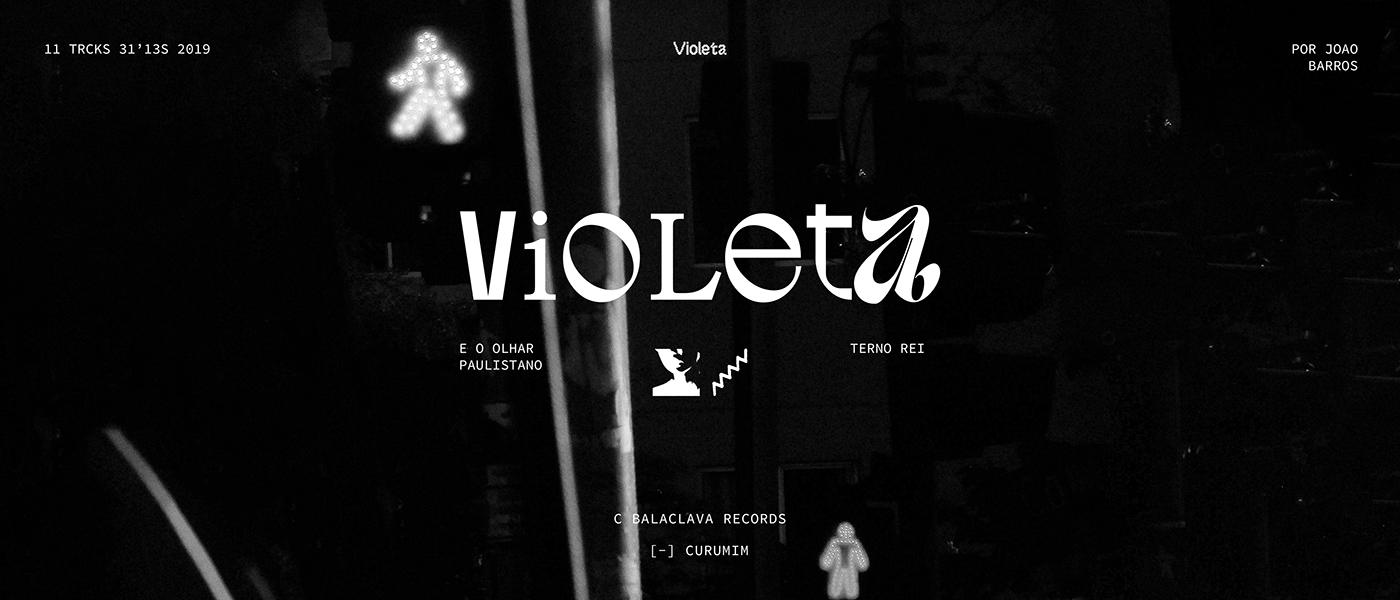
PT-BR
Violeta é o terceiro álbum de estúdio da banda de indie pop paulistana, e parando para ouvi-lo com mais atenção e com outra visão, entendi que o disco era uma bela representação de São Paulo, a maior cidade da américa latina. Meio que te esmaga se você ouvir as músicas tristes em um dia cinza, e te dá uma motivação pra seguir em frente se você ouvir as mais animadinhas no caminho pro trabalho.
Baseado nisso, reuni algumas fotografias da metrópole e criei letterings para cada canção, reunindo os dois de uma maneira que formasse um pequeno cartão postal, refletindo o contexto da canção com a vida agitada na cidade
EN
Violeta is the third studio album by the indie pop band from São Paulo, and stopping to listen to it more carefully and with a different perspective, I understood that the album was a beautiful representation of São Paulo, the largest city in Latin America. It kind of crushes you if you listen to the sad songs on a gray day, and gives you motivation to keep going if you listen to the upbeat ones on the way to work.
Based on this, I gathered some photographs of the metropolis and created letterings for each song, bringing the two together in a way that formed a small postcard, reflecting the context of the song with the busy life in the city.
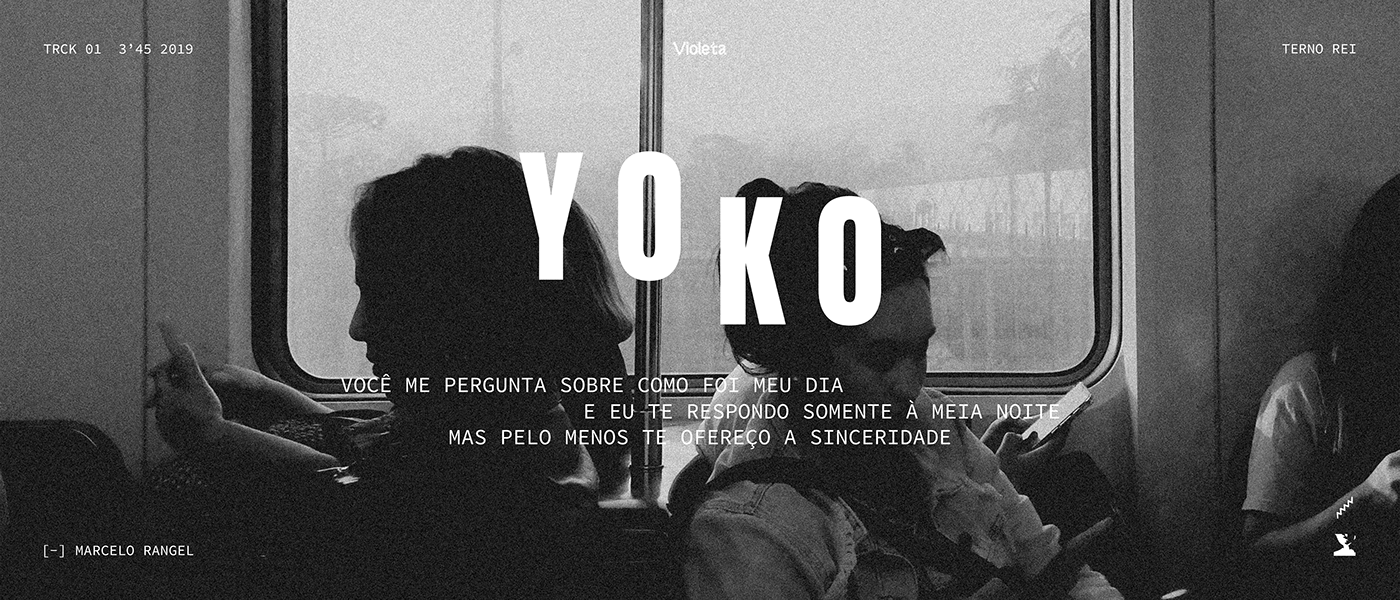
1. Yoko (PT-BR)
"Você me pergunta sobre como foi meu dia e eu te respondo somente à meia noite. Mas pelo menos te ofereço a sinceridade"
O dia a dia é diferente do romance idealizado, não temos tempo para outras pessoas, infelizmente. O momento em que paramos para nos conectar é no trajeto, no metrô. Por isso, "Yo" está acima e "Ko" está abaixo, representando o dia e a noite, os opostos, que juntam-se e formam o título da canção.
(EN)
"You ask me about my day and I only answer you at midnight. But at least I offer you honesty"
Everyday life is different from the idealized romance, we don't have time for other people, unfortunately. The moment we stop to connect is on the journey, on the subway. Therefore, "Yo" is above and "Ko" is below, representing day and night, the opposites, which come together and form the title of the song.

2. Dia Lindo (PT-BR)
"Sobre o dia em que me deixou triste, foi o dia em que tu decidiste ir. E a previsão de tempo errada diz que o dia hoje seria frio, mas hoje fez um dia quente, fez um dia lindo"
Sobre perder alguém e perceber que isso foi, no final das contas, benéfico. A fotografia do Parque do Ibirapuera, um lugar tão icônico da capital, é escolhida para representar um dia bonito e quente, como de fato é. O destaque vai para os dois patos, onde um está deixando o outro, como conta a canção.
(EN)
"About the day that made me sad, it was the day you decided to go. And the wrong weather forecast said that today would be cold, but today was a warm day, it was a beautiful day"
About losing someone and realizing that it was ultimately beneficial. The photograph of Ibirapuera Park, such an iconic place in the capital, is chosen to represent a beautiful and hot day, as it actually is. The highlight goes to the two ducks, where one is leaving the other, as the song says.
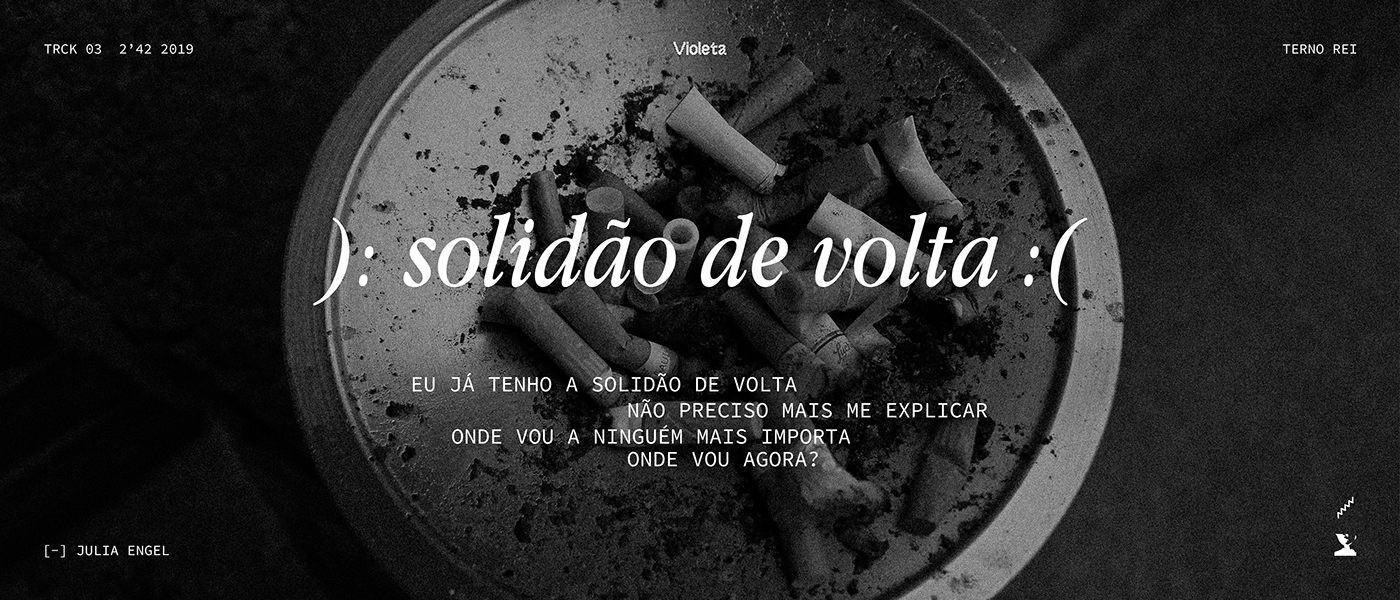
3. Solidão De Volta (PT-BR)
"Eu já tenho a solidão de volta, não precisa mais se preocupar. Onde vou a ninguém mais importa, onde vou agora?"
Aceitar a solidão após ser deixado é o momento em que nos agarramos à qualquer coisa (ou pessoa) para suprir a falta do outro em nós. Me lembrei dos vícios, da necessidade de uma substância para conforto e prazer momentâneo, sendo assim, cigarros foram escolhidos ao lado de uma tipografia rústica e tradicional, já que a dor não começa do nada, ela vem de muito antes.
(EN)
"I already have my loneliness back, there's no need to worry anymore. Where I go no one else matters, where am I going now?"
Accepting loneliness after being left is the moment when we cling to anything (or person) to make up for the lack of the other in us. I remembered addictions, the need for a substance for comfort and momentary pleasure, so cigarettes were chosen alongside a rustic and traditional typography, since pain doesn't start from nowhere, it comes from long before.
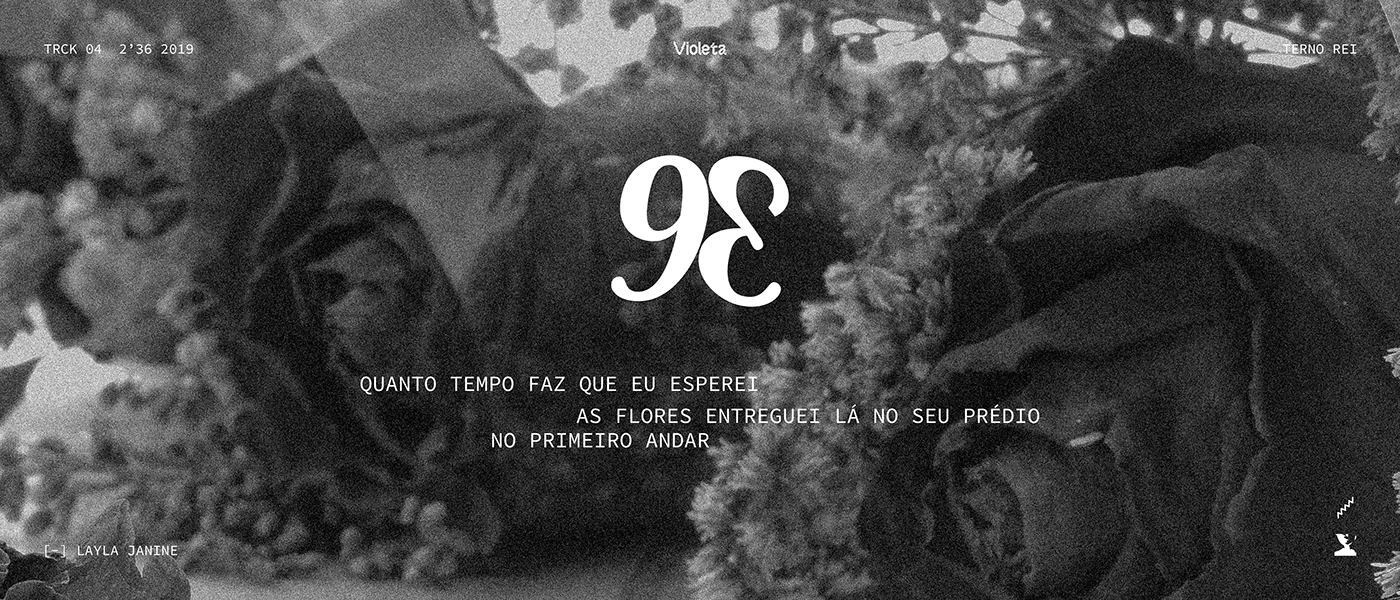
4. 93 (PT-BR)
"Quanto tempo faz que eu esperei, as flores entreguei lá no seu prédio, no primeiro andar"
93 é uma faixa melancólica, onde podemos presenciar o eu lírico dando tudo de si para um outro alguém que não o quer, necessariamente. O ato de entregar as flores para alguém que tanto se esperava reflete a como nós nos esforçamos demais para oportunidades que não nos pertencem. Por isso, a fotografia das rosas largadas ao chão, desprezadas, o tudo de alguém que já não vale nada para outra pessoa.
(EN)
"How long have I waited, I delivered the flowers to your building, on the first floor"
93 is a melancholic track, where we can witness the lyrical self giving his all to someone else who doesn't necessarily want him. The act of giving flowers to someone who was expected so much reflects how we try too hard for opportunities that don't belong to us. That's why the photograph of roses lying on the ground, neglected, someone's everything that is no longer worth anything to someone else.
93 is a melancholic track, where we can witness the lyrical self giving his all to someone else who doesn't necessarily want him. The act of giving flowers to someone who was expected so much reflects how we try too hard for opportunities that don't belong to us. That's why the photograph of roses lying on the ground, neglected, someone's everything that is no longer worth anything to someone else.

5. Medo (PT-BR)
"Faz tanto tempo que já tanto faz, o tempo já não é nada demais e eu já não tenho medo de voar"
Em "Medo", o disco começa a trazer um pouco de otimismo e independência, ainda que a sonoridade sempre nos remeta à melancolia. Aqui, já se foi aceita a realidade e é hora de encará-la. A foto, tirada no Parque do Ibirapuera, mostra alguém - Marcelo Rangel, fotógrafo da imagem em questão - olhando para o ambiente a sua volta. Para mim, é a representação da aceitação, se fazer presente, pois agora não há medo de enfrentar as situações, tendo a mensagem refletida na tipografia cortada por um X.
(EN)
"It's been so long, time is no longer a big deal and I'm no longer afraid of flying"
In "Medo", the album begins to bring a bit of optimism and independence, even though the sound always reminds us of melancholy. Here, reality has been accepted and it is time to face it. The photo, taken in Ibirapuera Park, shows someone - Marcelo Rangel, photographer of the image in question - looking at the environment around him. For me, it is the representation of acceptance, being present, as now there is no fear of facing situations, with the message reflected in the typography cut by an X.
In "Medo", the album begins to bring a bit of optimism and independence, even though the sound always reminds us of melancholy. Here, reality has been accepted and it is time to face it. The photo, taken in Ibirapuera Park, shows someone - Marcelo Rangel, photographer of the image in question - looking at the environment around him. For me, it is the representation of acceptance, being present, as now there is no fear of facing situations, with the message reflected in the typography cut by an X.

6. Estava Ali (PT-BR)
"Vou deixar a vida me dizer que eu não sou capaz de ser quem você quer, e não aguento mais o peso que me traz. Sentido não faz mais, eu vou me esconder"
"Estava Ali" toca no coração daqueles que um dia se sentiram insuficientes, e a dor da insuficiência parte do ponto em que em algum momento tentamos algo, nem que seja impressionar o outro com nosso singelo jeito de ser. No cotidiano, mal nos fazemos presentes, vemos vultos que não veremos de novo.
Decidi representar isso usando uma fonte em itálico e em negrito na palavra "estava", pois por algum momento nós existimos nem que seja na memória de alguém, e "ali" possui um peso leve na fonte, simbolizando o que já passou.
(EN)
"I'm going to let life tell me that I'm not capable of being who you want, and I can't take the weight it brings me anymore. It doesn't make sense anymore, I'm going to hide"
"Estava Ali" touches the hearts of those who once felt insufficient, and the pain of insufficiency starts from the view where at some point we try something, even if it is to impress others with our simple way of being. In everyday life, as soon as we are present, we see figures that we will never see again.
"Estava Ali" touches the hearts of those who once felt insufficient, and the pain of insufficiency starts from the view where at some point we try something, even if it is to impress others with our simple way of being. In everyday life, as soon as we are present, we see figures that we will never see again.
I decided to represent this by using a bold, italicized font on the word “estava”, because for some moment we were there, and “ali” has a light weight in the font, symbolizing what has already passed.

7. Amor-Perfeito (PT-BR)
"Pois esse bairro está tão colorido e não é carnaval, não tem folia"
Amor-Perfeito possui um instrumental leve e cativante. A música possui apenas uma pequena estrofe, cantada no final da canção. Indiretamente ou não, é uma maneira de mostrar que não existe um amor perfeito.
Por isso, na fotografia há uma janela vazia, sem nada ilustrando o título da faixa que, por sinal, foi inspirado nos títulos das pequenas novenas e livros de bolso consumidos no nosso passado.
(EN)
"Because this neighborhood is so colorful and it's not carnival, there's no festivities"
Amor-Perfeito has a light and captivating instrumental. The song only has one short verse, sung at the end of the song. Indirectly or not, it's a way of showing that there is no such thing as perfect love.
Amor-Perfeito has a light and captivating instrumental. The song only has one short verse, sung at the end of the song. Indirectly or not, it's a way of showing that there is no such thing as perfect love.
Therefore, in the photograph there is an empty window, with nothing illustrating the title of the track which, by the way, was inspired by the titles of small novenas and pocket books consumed in our past.
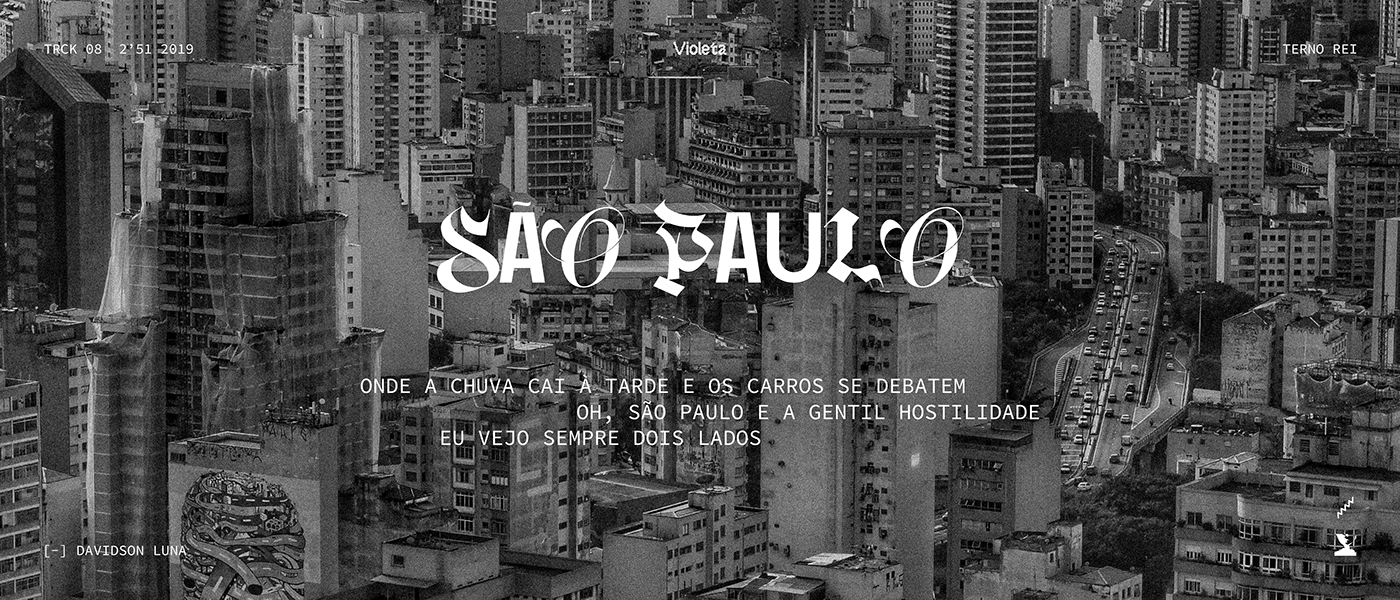
8. São Paulo (PT-BR)
"Onde a chuva cai à tarde e os carros se debatem, oh São Paulo e a gentil hostilidade, eu vejo sempre dois lados"
Como resumir uma cidade em versos tão curtos? O fato é que sim, a capital faz questão de te mostrar a todo tempo o quão pequeno você é comparado à ela. Os prédios amontoados te guiam pelas avenidas, onde você traça labirintos para tentar chegar nos seus objetivos. O estranho é que há uma beleza nisso tudo, desde a arte de tentar sobreviver aos grafites que enfeitam o cinza.
A tipografia foi inspirada nessa mescla, no caos, no grafite e na arte urbana que tanto caracterizam essa metrópole.
(EN)
"Where the rain falls in the afternoon and the cars struggle, oh São Paulo and the gentle hostility, I always see two sides"
How can you recapture a city in such short verses? The fact is that yes, the capital makes a point of showing you at all times how small you are compared to it. The crowded buildings guide you along the avenues, where you trace mazes to try to reach your goals. The strange thing is that there is a beauty in it all, from the art of trying to survive, to the graffiti that adorns the gray.
How can you recapture a city in such short verses? The fact is that yes, the capital makes a point of showing you at all times how small you are compared to it. The crowded buildings guide you along the avenues, where you trace mazes to try to reach your goals. The strange thing is that there is a beauty in it all, from the art of trying to survive, to the graffiti that adorns the gray.
The typography was inspired by this mix, chaos, graffiti and urban art that so characterizes this metropolis.

9. Luzes De Natal (PT-BR)
"Todos juntos, a maneira de levar por esses anos. E as luzes de Natal quase estão acesas e faz uma semana que eu estou correndo"
Luzes De Natal é mais uma personificação da correria e da vida agitada que nos acompanha diariamente, a nossa falta de tempo e de como, por aqui, estamos sempre atrasados. Nossas luzes de Natal não são acesas em dezembro, elas vão se ascendendo conforme passamos as estações do metrô até chegar no nosso destino, durante todo o ano.
(EN)
"All together, the way to carry through these years. And the Christmas lights are almost on and I've been running for a week"
Luzes De Natal is yet another personification of the rush and hectic life that accompanies us daily, our lack of time and how, around here, we are always late. Our Christmas lights are not turned on in December, they come on as we pass the metro stations until we reach our destination, throughout the year.
Luzes De Natal is yet another personification of the rush and hectic life that accompanies us daily, our lack of time and how, around here, we are always late. Our Christmas lights are not turned on in December, they come on as we pass the metro stations until we reach our destination, throughout the year.
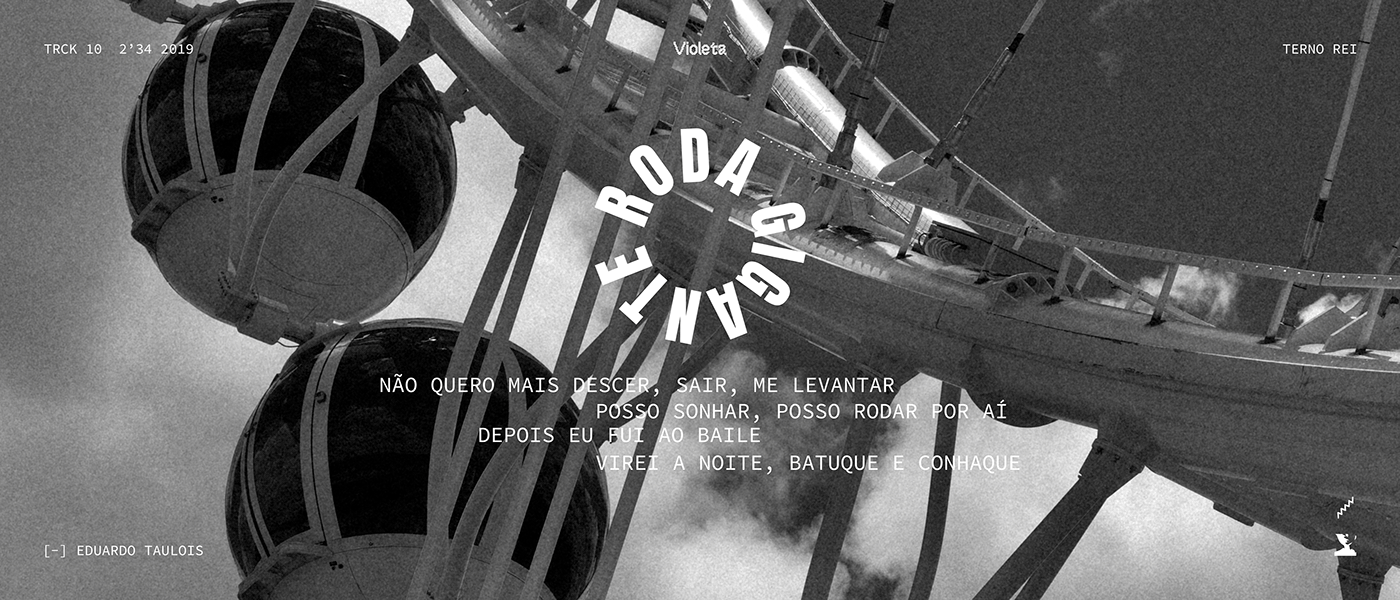
10. Roda Gigante (PT-BR)
"Não quero mais descer, sair, me levantar. Posso sonhar, posso rodar por aí"
Na penúltima faixa do disco, a banda nos coloca frente à frente em um ciclo vicioso. Por que sair da zona de conforto quando se é confortável? Em meio ao caos nos vemos presos em um caminho que se repete, a rotina nos coloca para viver uma felicidade programada.
A fotografia foi tirada no Parque Villa Lobos, em São Paulo, onde se encontra a maior roda gigante da américa latina onde, na tipografia, é referida pelo título em torno de um circulo
(EN)
"I don't want to go down, go out, get up anymore. I can dream, I can run around"
In the penultimate track of the album, the band puts us face to face in a vicious cycle. Why leave your comfort zone when you are comfortable? In the midst of chaos we find ourselves stuck on a path that repeats itself, routine sets us up to experience programmed happiness.
The photograph was taken at Parque Villa Lobos, in São Paulo, where the largest Ferris wheel in Latin America is located where, in the typography, it is referred to by the title around a circle.
In the penultimate track of the album, the band puts us face to face in a vicious cycle. Why leave your comfort zone when you are comfortable? In the midst of chaos we find ourselves stuck on a path that repeats itself, routine sets us up to experience programmed happiness.
The photograph was taken at Parque Villa Lobos, in São Paulo, where the largest Ferris wheel in Latin America is located where, in the typography, it is referred to by the title around a circle.

11. Roda Gigante (PT-BR)
"E eu conheço a sua dor, eu andei por esses lados, não tem nada demais. Quando eu estou aqui, estou inteiro"
Fechando o disco - e o projeto - "Vento Na Cara" é a brisa reconfortante depois dessa tempestade de melancolia e pessimismo. Estar aqui, é de fato estar inteiro, não é fácil, te testa o tempo inteiro, te obriga a se desmontar e se reinventar. Mas, no final do dia, ainda temos um ao outro, nossas conexões e a felicidade em poder vencer aos dias ruins que a vida nos obriga a enfrentar.
O vento na cara mais literal que é sentido todos os dias é aquele que vem junto com o trem, na forma mais pura, suja e verdadeira que é.
(EN)
"And I know your pain, I've been around these parts, it's no big deal. When I'm here, I'm whole"
Closing the album - and the project - "Vento Na Cara" is the comforting breeze after this storm of melancholy and pessimism. Being here is in fact being whole, it's not easy, it tests you all the time, it forces you to dismantle yourself and reinvent yourself. But, at the end of the day, we still have each other, our connections and the happiness in being able to overcome the bad days that life forces us to face.
The most literal wind in the face that is felt every day is the one that comes along with the train, in the purest, dirtiest and truest form that it is.
Closing the album - and the project - "Vento Na Cara" is the comforting breeze after this storm of melancholy and pessimism. Being here is in fact being whole, it's not easy, it tests you all the time, it forces you to dismantle yourself and reinvent yourself. But, at the end of the day, we still have each other, our connections and the happiness in being able to overcome the bad days that life forces us to face.
The most literal wind in the face that is felt every day is the one that comes along with the train, in the purest, dirtiest and truest form that it is.
Agradecimentos especiais
Special thanks
À todos os fotógrafos e fotógrafas que me concederam suas imagens lindas e suas visões únicas:
(EN) To all the photographers who gave me their beautiful images and unique visions:
Curumim
Davidson Luna
Denys Argyriou
Eduardo Taulois
Julia Engel
Layla Janine de Oliveira
Lucas Santos
Marcelo Rangel
Raphael Brasileiro
Vitor
Davidson Luna
Denys Argyriou
Eduardo Taulois
Julia Engel
Layla Janine de Oliveira
Lucas Santos
Marcelo Rangel
Raphael Brasileiro
Vitor
Ao Terno Rei e Balaclava Records por produzirem um disco tão importante e suficiente para ser a base do projeto
(EN) To Terno Rei and Balaclava Records for producing such an important and sufficient album to be the basis of the project
Esse é um projeto pessoal sem fins lucrativos.
(EN) This is a personal non-profit project.
Todas as fotografias foram tiradas em São Paulo, Brasil
(EN) All photographs were taken in São Paulo, Brazil





